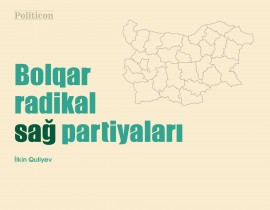Politicon.co
The rise of artificial intelligence: Georgia standing up to risks
As a result of living in the age of technology, artificial intelligence continues to exist in almost every aspect of our lives. Ongoing developments in the field of artificial intelligence makes it accessible for everyone. The main purpose of artificial intelligence is to perform the mental activities that humans perform through computers. Artificial intelligence is used in automatic language translation, voice recognition, autonomous vehicles, smart home systems, games, chatbots and other fields of daily life. The use of artificial intelligence (AI) systems in the public sector can yield significant benefits in terms of simplifying the decision-making process, improving service delivery, and introducing many other innovative approaches. However, there is no internationally accepted concept for the definition of artificial intelligence. Regulations regarding artificial intelligence need to strike the ultimate balance between controlling risks and encouraging technological developments. In this sense, the new regulatory framework for artificial intelligence should not be excessively prescriptive, which will not hinder technological development, and at the same time should be efficient in controlling risks. In its broadest sense, AI presents itself as a variation of computer algorithms, and is considered as a technological development, with its constantly increasing capabilities. However, it comes with several risk factors that can not be underestimated.
All these risks and legal problems have become the main focus of countries that want to take advantage of the innovative breakthrong introduced by artificial intelligence. The Georgian Constitution and other legal regulations impose some normative requirements for the use of the algorithms. In the Legislative Herald of Georgia, the term “artificial intelligence” is used only three times among the normative laws. None of them is a legal action, however two of them mention the use of artificial intelligence in the private finance sector, and one of them stresses the role of artificial intelligence in entrepreneurship (startup) activities. Lack of regulation in Georgian legislation regarding the use of artificial intelligence hinders its use in the public sector, however, this fact does not imply that the use of artificial intelligence in the public sector is prohibited in this regard, the use of artificial intelligence faces many (potential) risks in terms of transparency, accountability, freedom of expression and the right to privacy.
As access to information increases with the development of technology, problems related to privacy and data confidentiality emerges. These risks arise in terms of the rights provided to individuals within the scope of the protection of personal data, such as the right to access personal data with informed consent, surveillance, the right to prevent data from being processed, and the right not to be subject to a decision based on automatic processing. Another risk that may arise regarding personal data is the use of anonymized data or scattered data with machine learning, which is a type of artificial intelligence, for the purpose of redefining.
One more ethical debate brought about by artificial intelligence is accountability issues. From an individual point of view, the fact that the decisions concerning people's lives are made by artificial intelligence may harm the dignity and individuality of the person, especially if it is not fully understood or even impossible to understand why the artificial intelligence made the potential decision. Therefore, AI is expected to work transparently, predictably and accurately. For example, a software produced for use in decision-making processes may be technically correct and free from any legal violations. However, this does not exclude the possibility that the software will not cause another public problem. To illustrate the risks more clearly, we might consider the example of the Central Data Bank. Specifically, the LEPL - Operational Technical Agency of the State Security Service was authorized to establish a central data bank. In accordance with Article 11 of the Law of Georgia “On Legal Entity of Public Law - Operational-Technical Agency of Georgia”, the Agency shall establish a central bank of identification data. To this purpose, it is authorized to "have remote access to the electronic communications identification databases of the electronic communications company and copy and store them." It should be noted that this database contains data identifying the Internet or telephone communication through the infrastructure of all electronic communications companies operating in Georgia. According to Article 2, paragraph z69 of the Law of Georgia “On Electronic Communications”, the electronic communication identification data is “user identification data; data required to trace and identify the source of communication; data required to identify the address of the communication; data required to identify the date, time and duration of the communication; data required to identify the type of communication; data required to identify communication equipment or possible equipment of the user; data required to identify the location of mobile communication equipment”. In short, the Central Data Bank of Georgia stores all communications (phone or internet) within the country. Whether this policy of the Central Data Bank is a personal data breach or not has been the subject of debate many times. Central Data Bank has been appealed in the Constitutional Court of Georgia twice already. The claim stated that it was unconstitutional for the bank to keep contact information. The Court has yet to issue a final decision on this case.
Considering lack of legislative acts in terms of artificial intelligence, the order "On the approval of the state of regulations for managing the risks of data-based statistical, artificial intelligence and machine learning models" issued by the President of the National Bank of Georgia in 2020 is noteworthy. This statute sets out the principles of risk management at the design, outsourcing, and start-up stages of the models and administrative-organizational control mechanisms for the oversight subjects of the National Bank (e.g., commercial banks, microfinance organizations) in the implementation of statistical, artificial intelligence and machine learning systems. The statute sets out the requirements for the establishment of processes and mechanisms, the provision of appropriate documentation, system/model control and audit forms, and the requirements to be observed when using data. In this regard, data quality should be assessed for data quality: data compatibility, data completeness, timeliness of data, access to data, and audit footprint. It is also important that the entities using the model develop ethical principles. Additionally, in the case of commercial banks, they are required to apply the relevant principles set out in the National Bank's Code of Ethics and Standards of Professional Conduct. This statute came into force in 2021 and aims to guarantee the transparency of artificial intelligence-based models in financial institutions through the process of planning control and documentation, as well as establishing a high standard of artificial intelligence risk management.
Furthermore, it can be said that the State of Georgia should consider important activities to solve the potential risks arising in the use of artificial intelligence. First of all, since the legal regulations are insufficient, the Georgian State should develop a legal framework, national concept and strategy regulating artificial intelligence. This could be followed by explanations on the role of artificial intelligence in the public sector, alongside promotion al activities. It would also be appropriate to open research centers for the use of artificial intelligence for the purpose of them an use. In order for all statements made and the research centers opened to work, the State should create opportunities and conditions for the use of artificial intelligence for those concerned. After facilitating the use of people, potential risks suitable for each sector should be determined by using research centers and strategies for their solution. For example, a high standard of privacy and personal data protection can be introduced as a risk solution. Finally, eliminating the imbalance between the potential capabilities of artificial intelligence and existing examples will both expand the use of artificial intelligence and be a great step towards solving potential risks.
The Georgian public sector should actively take action to stimulate the use of modern technologies, including artificial intelligence, both in public institutions and on a large scale – across the entire country. Georgia must utilize all of the advantages that accompany the introduction of artificial intelligence in a timely and effective manner, so as not to lag far behind the economic-social transformation inspired by artificial intelligence and not miss out on the benefits provided by this process.
The lack of legislative acts might severe privacy issues, endangering data protection of individuals, as well as companies and even government institutions. This brings along many (potential) risks including data breach, transparency issues and etc. Having a regulatory base for the use of such complex and dangerous technology is mandatory. Although the Georgian State has brought some regulations for the agreement upon the topic of the risks, a complete solution has not been reached yet. Identifying the potential risks of artificial intelligence suitable for each sector and starting to develop an appropriate strategy in research centers will be a big step towards risk resolution.
REFERENCES
Rodrigues, Rowena, "Legal and human rights issues of AI: Gaps, challenges and vulnerabilities", Journal of Responsible Technology, C.4, 2020 (https://doi.org/10.1016/j.jrt.2020.100005, e.t. 16.04.2021)
Brogan, Caroline, "Anonymising personal data ‘not enough to protect privacy’, shows new study", Imperial Collage London, 2019 (https://www.imperial.ac.uk/news/192112/anonymising-personal-data-enough-protectprivacy/, e.t. 16.04.2021)
The Ethics of Artificial Intelligence: Issues and Initiatives, European Parliamentary Research Service, by., 2020 (https://www.europarl.europa.eu/RegData/etudes/STUD/2020/634452/EPRS_STU(20 20)634452_EN.pdf, e.t. 16.04.2021)
Gordon, John-Stewart/ Nyholm, Sven, "Ethics of Artificial Intelligence", The Internet Encyclopedia of Philosophy, ty. (https://iep.utm.edu/ethic-ai/#SH2d, e.t. 16.04.2021)
Desai, Deven R./ Kroll, Joshua A., "Trust But Verify: A Guide to Algorithms and the Law", Harvard Journal of Law & Technology, 2017, s.8, (https://ssrn.com/abstract=2959472, e.t. 16.04.2021)
Artificial İntelligence: Meaning, International Standards, Ethical Norms, Recommendations and Conclusions, Tbilisi, Georgia - https://idfi.ge/public/upload/Article/1111Artificial-Intelligence-ENG_Web%20Version.pdfchrome-extension://efaidnbmnnnibpcajpcglclefindmkaj/https://idfi.ge/public/upload/Article/ENG%20The%20Use%20of%20Artificial%20Intelligence%20Systems%20in%20Georgia_Legislation%20and%20Practice_19_02_2021.pdf
![]()
- TAGS :
- Georgia
- artificial intelligence
- TOPICS :
- Domestic affairs
- REGIONS :
- Russia and CIS







jpg-1599133320.jpg)
